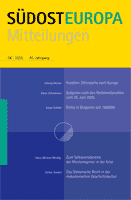Vertraute Fremdheit – Das Osmanische Reich in der makedonischen Geschichtskultur
Familiar Strangeness – The Ottoman Empire in the Macedonian Historical Culture
Author(s): Stefan TroebstSubject(s): History
Published by: Südosteuropa Gesellschaft e.V.
Summary/Abstract: Under the heading „Familiar Strangeness“, this article looks at the presence of the Ottoman legacy in the historical culture of contemporary Macedonia. In particular, the everyday life of this Balkan society abounds with Ottoman features – a phenomenon reflected amply in the Macedonian language. The historiography of Macedonia displays ambivalence toward the Ottoman past: On one hand, the Ottoman centuries are depicted as a foreign rule that was met with resistance by the Macedonian people. On the other hand, the preservation of the Macedonian culture is attributed to the fact that under the Sultans, the Christian-Orthodox Church was largely untouched. Finally, the clash of official politics of remembrance and private memory is highlighted by the example of Todor “Gabero” Dimov (1872-1977) of Bitola, who joined an anti-Ottoman partisan unit for personal, not political reasons in 1899. During the last third of the 20th century, both his right-wing grandson in his Belgian exile and the Communist Institute of National History in Skopje set out to reinterpret Gabero’s personal decision of 1899 as a political act in support of the Macedonian national movement.
Journal: Südosteuropa Mitteilungen
- Issue Year: 2005
- Issue No: 06
- Page Range: 62-70
- Page Count: 9
- Language: German
- Content File-PDF

